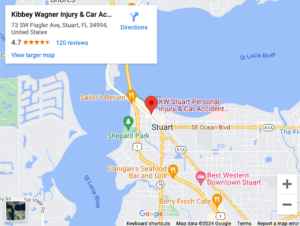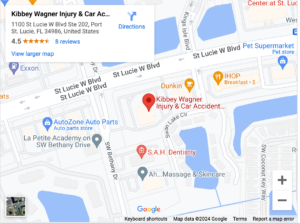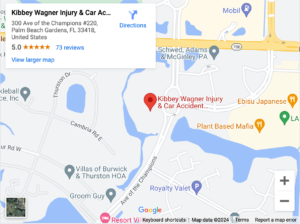
If you’ve been hurt in a car crash or other accident in Florida, you may face expensive medical bills while waiting for your personal injury case to settle. In many cases, doctors and hospitals agree to provide treatment now in exchange for a medical lien.
Understanding how medical liens work is crucial. If they’re not handled correctly, they can take a big chunk out of your recovery. At Kibbey Wagner Injury & Car Accident Lawyers, we are committed to securing the compensation you deserve. We will help you understand how medical liens may affect your case and ensure as much of your settlement goes into your pocket as possible.
What Is a Medical Lien?

A medical lien is a legal agreement that gives a healthcare provider the right to be paid from the money you recover in your personal injury case. Instead of requiring you to pay for care upfront, the provider treats you and waits for reimbursement when your case resolves.
Medical liens are common in personal injury cases where victims:
- Don’t have health insurance
- Can’t afford out-of-pocket costs
- Need specialized care not covered by insurance
- Face long-term or catastrophic injuries
The lien ensures the provider gets paid and allows you to get the treatment you need without delay.
What Are The Types of Medical Liens in Personal Injury Cases?
Not all medical liens are the same. The most common types include hospital liens, private healthcare provider liens, government liens, and health insurance liens.
1. Hospital Liens
Florida no longer has a statewide hospital lien law following a 2012 Florida Supreme Court ruling declaring it unconstitutional. However, some counties still maintain hospital lien ordinances, such as Alachua and Collier (limited to charitable hospitals). These local laws give hospitals a lien on personal injury settlement proceeds to recover the cost of emergency or necessary treatment.
In counties without such ordinances, like Martin County, hospitals cannot file liens and must pursue payment through insurance claims or by billing the patient directly.
When allowed, hospital liens often take priority over other claims, though exceptions exist for federal liens (e.g., Medicare, Medicaid) and sometimes PIP. These liens generally cannot be reduced by attorney’s fees and may apply to the full amount of the billed services, provided the hospital complies with the ordinance’s notice and timing requirements.
2. Private Healthcare Provider Liens
Doctors, chiropractors, and rehabilitation specialists may agree to treat you in exchange for a lien if you can’t pay upfront. In this case, you would sign a legal document giving the provider a secured interest in the compensation you receive from a personal injury case.
4. Government Liens (Medicare/Medicaid)
If Medicare or Medicaid paid for medical bills related to your accident, a lien may be applied automatically to your potential settlement.
Florida’s Medicaid Third-Party Liability Act gives Medicaid priority over all other individuals or programs, ensuring they are paid from the proceeds—even if you are left with nothing. The federal Medicare Secondary Payer (MSP) Act also gives Medicare an automatic lien against your settlement. This law makes Medicare a secondary payer, so it has the right to reimbursement if it pays for services that should have been paid by another policy or a liable third party.
3. Health Insurance Liens (Subrogation)
If your health insurance covers accident-related treatment, your insurer has the right to recover what it paid once you win your case. This is called a right of subrogation. The insurance company can seek reimbursement for payments made to you or on your behalf from the liable party, or from any settlement proceeds you receive.
This right also extends to employers and insurance carriers after a workplace accident. If you have a third-party claim against a negligent party other than your employer, a lien can be placed on the settlement for the amount the employer paid in benefits.
How Do Medical Liens Affect Your Settlement?
Medical liens can have a significant impact on how much of your settlement you receive. Medical liens must be paid out of your settlement before you receive any money. That means if your settlement is $100,000 and your medical liens total $40,000, you’ll only receive $60,000 (before attorneys’ fees and other expenses).
Settlement proceeds are generally paid out in this order of priority:
- Medicare/Medicaid liens
- Hospital liens
- Other medical liens
- Attorney’s fees
- Claimant
If you ignore a lien or fail to resolve it, the lienholder can sue to enforce payment, even after you receive your settlement. In some cases, unresolved liens can delay or block the release of your settlement funds altogether.
How Can A Lawyer Help You Handle Medical Liens?
There are many ways a personal injury lawyer can help with medical liens after your accident.
Your attorney will:
- Ensure the lien is valid
- Review itemized bills for billing errors or inconsistencies
- Challenge invalid liens, incorrect charges, and excessive charges
- Negotiate with lienholders to reduce the lien amount
Your lawyer may use many strategies to mitigate the impact of medical liens on your settlement. They may prove insufficient settlement funds or explain financial hardship and the impact of a catastrophic injury, for example.
Contact Kibbey Wagner Injury & Car Accident Lawyers for a Free Consultation
Medical liens can feel overwhelming, but you don’t have to face them alone. With the right legal help, you can get the treatment you need now while protecting the settlement you deserve later.
Kibbey Wagner Injury & Car Accident Lawyers is here to stand by your side. We’ll handle the lien negotiations, fight for your compensation, and make sure you walk away with as much as possible to rebuild your life.
Contact us today at (772) 444-7000 for a free consultation with a personal injury attorney, and let’s discuss how we can help you.




